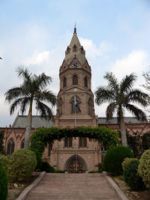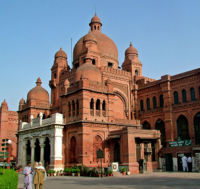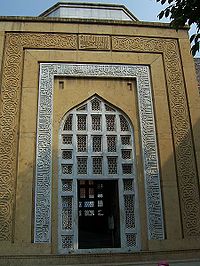Lahore: Difference between revisions
→Maps: photographs |
Symorsebrown (talk | contribs) Add internal link |
||
| Line 11: | Line 11: | ||
==History== | ==History== | ||
==Churches== | ==Churches== | ||
| Line 22: | Line 21: | ||
*Cathedral of the Immaculate Conception - built 1861 | *Cathedral of the Immaculate Conception - built 1861 | ||
*Sacred Heart Cathedral - consecrated 1907, the seat of the Diocese of Lahore | *Sacred Heart Cathedral - consecrated 1907, the seat of the Diocese of Lahore | ||
==Education== | ==Education== | ||
| Line 35: | Line 33: | ||
* King Edward Medical College (now University) | * King Edward Medical College (now University) | ||
* University of Punjab | * University of Punjab | ||
==Health== | ==Health== | ||
| Line 45: | Line 42: | ||
===Dispensaries=== | ===Dispensaries=== | ||
==Cemeteries== | ==Cemeteries== | ||
| Line 61: | Line 57: | ||
* The Australasia Bank (1942) | * The Australasia Bank (1942) | ||
* Punjab National Bank (1895) | * Punjab National Bank (1895) | ||
==Buildings== | ==Buildings== | ||
* Lawrence Hall (now part of Quaid-e-Azam Library) [http://www.flickr.com/photos/sarfrazh/2599957383/ Photograph] | * Lawrence Hall (now part of Quaid-e-Azam Library) [http://www.flickr.com/photos/sarfrazh/2599957383/ Photograph] | ||
* Montgomery Hall (now part of Quaid-e-Azam Library) | * Montgomery Hall (now part of Quaid-e-Azam Library) | ||
==Military== | ==Military== | ||
| Line 72: | Line 66: | ||
Lahore was the head-quarters of the [[Punjab Light Horse]] and of the [[Punjab Rifles|1st Punjab Volunteer Rifles]].<ref>[http://www.archive.org/stream/imperialgazette05unkngoog#page/n72/mode/1up ''Imperial Gazetteer of India : Provincial Series Punjab Volume II The Lahore, Rawalpindi and Multan Divisions and Native States''], page 40 1908 Archive.org</ref> [http://www.emule.com/2poetry/phorum/read.php?4,12692 "A Beleagured City"],is a parody by Rudyard Kipling about the proximity of the firing range of the Punjab Volunteer Rifles to the Lawrence Hall Gardens | Lahore was the head-quarters of the [[Punjab Light Horse]] and of the [[Punjab Rifles|1st Punjab Volunteer Rifles]].<ref>[http://www.archive.org/stream/imperialgazette05unkngoog#page/n72/mode/1up ''Imperial Gazetteer of India : Provincial Series Punjab Volume II The Lahore, Rawalpindi and Multan Divisions and Native States''], page 40 1908 Archive.org</ref> [http://www.emule.com/2poetry/phorum/read.php?4,12692 "A Beleagured City"],is a parody by Rudyard Kipling about the proximity of the firing range of the Punjab Volunteer Rifles to the Lawrence Hall Gardens | ||
==Transport== | ==Transport== | ||
| Line 78: | Line 71: | ||
*Lahore Railway Station | *Lahore Railway Station | ||
Lahore was the headquarters of [[North Western Railway]]. There were railway workshops and a railway colony. | Lahore was the headquarters of [[North Western Railway]]. There were railway workshops and a railway colony. | ||
==Gardens and Parks== | ==Gardens and Parks== | ||
* Lawrence Gardens (1860) (now [http://en.wikipedia.org/wiki/Bagh-e-Jinnah Bagh-e-Jinnah]) - [http://pakistaniat.com/2006/07/29/guest-post-lawrence-gardens-lahore/ Article] [http://www.flickr.com/photos/8984406@N07/5342042351/ Montgomery Hall-Photo] | * Lawrence Gardens (1860) (now [http://en.wikipedia.org/wiki/Bagh-e-Jinnah Bagh-e-Jinnah]) - [http://pakistaniat.com/2006/07/29/guest-post-lawrence-gardens-lahore/ Article] [http://www.flickr.com/photos/8984406@N07/5342042351/ Montgomery Hall-Photo] | ||
* Minto Park (now [http://en.wikipedia.org/wiki/Iqbal_Park Iqbal Park]) near the Wall City, Fort and Badshahi Mosque. | * Minto Park (now [http://en.wikipedia.org/wiki/Iqbal_Park Iqbal Park]) near the Wall City, Fort and Badshahi Mosque. | ||
==Places of interest== | ==Places of interest== | ||
| Line 98: | Line 89: | ||
* Mahabat Khan's tomb and Boundary Wall, Baghbanpura (near Shalimar Gardens) | * Mahabat Khan's tomb and Boundary Wall, Baghbanpura (near Shalimar Gardens) | ||
* Prince Perwaiz's tomb. Chah Miran area. | * Prince Perwaiz's tomb. Chah Miran area. | ||
* Wazir Khan's Hammam | * [[Mughal_Empire#Wazir|Wazir]] Khan's Hammam | ||
* Wazir Khan's Baradari (served as soldier's quarters until cantonment shifted to Mian Mir.) Behind Lahore Museum.<ref>Nadiem, Ihsan H. "Historic Landmarks of Lahore An Account of Protected Monuments" Lahore: Sang-e-Meel 2006 ISBN 969-35-1869-1 pg 70</ref> | * Wazir Khan's Baradari (served as soldier's quarters until cantonment shifted to Mian Mir.) Behind Lahore Museum.<ref>Nadiem, Ihsan H. "Historic Landmarks of Lahore An Account of Protected Monuments" Lahore: Sang-e-Meel 2006 ISBN 969-35-1869-1 pg 70</ref> | ||
===Protected Monuments=== | ===Protected Monuments=== | ||
| Line 123: | Line 113: | ||
* Roshnai Gate (1935) (part of the fortification wall) | * Roshnai Gate (1935) (part of the fortification wall) | ||
* Shalimar Gardens (1913) | * Shalimar Gardens (1913) | ||
* Wazir Khan's Mosque (1925) | * [[Mughal_Empire#Wazir|Wazir]] Khan's Mosque (1925) | ||
==Statues== | ==Statues== | ||
| Line 133: | Line 123: | ||
* [http://en.wikipedia.org/wiki/Ganga_Ram Sir Ganga Ram] | * [http://en.wikipedia.org/wiki/Ganga_Ram Sir Ganga Ram] | ||
* [http://en.wikipedia.org/wiki/John_Lawrence,_1st_Baron_Lawrence Sir John Lawrence] | * [http://en.wikipedia.org/wiki/John_Lawrence,_1st_Baron_Lawrence Sir John Lawrence] | ||
==Maps== | ==Maps== | ||
| Line 144: | Line 133: | ||
==References== | ==References== | ||
<references/> | <references/> | ||
==External links== | ==External links== | ||
[http://www.tcaup.umich.edu/workfolio/glover.pdf "'A Feeling of Absence from Old England:' the Colonial Bungalow"] by William J Glover. ''Home Cultures Volume 1 Issue 1'' pages 61-82 2004(?). Contains references to Lahore from page 3 of the pdf. “By the late nineteenth century, Lahore was a desirable posting for European officers and civilians due to its large size, moderate climate, and relatively cosmopolitan range of institutions and activities.” | [http://www.tcaup.umich.edu/workfolio/glover.pdf "'A Feeling of Absence from Old England:' the Colonial Bungalow"] by William J Glover. ''Home Cultures Volume 1 Issue 1'' pages 61-82 2004(?). Contains references to Lahore from page 3 of the pdf. “By the late nineteenth century, Lahore was a desirable posting for European officers and civilians due to its large size, moderate climate, and relatively cosmopolitan range of institutions and activities.” | ||
===Historical books online=== | ===Historical books online=== | ||
Revision as of 12:56, 27 March 2011
| Lahore | |
|---|---|
| [[Image:|250px| ]] | |
| Presidency: Bengal | |
| Coordinates: | 31.545073°N 74.340835°E |
| Altitude: | 217 m (712 ft) |
| Present Day Details | |
| Place Name: | Lahore |
| State/Province: | Punjab |
| Country: | Pakistan |
| Transport links | |
Lahore was the capital of undivided Punjab until Partition in 1947, after which it became the capital of West Punjab in Pakistan.
History
Churches
Anglican
- Lahore Cathedral (Cathedral Church of Resurrection) - consecrated in 1887
- St Andrew's (The Railway Church) - built in 1899 to serve the Railway colony, near the North Western Railway Headquarters
- St Anthony's - also near the North Western Railway Headquarters on Empress Road
Roman Catholic
- Cathedral of the Immaculate Conception - built 1861
- Sacred Heart Cathedral - consecrated 1907, the seat of the Diocese of Lahore
Education
Schools
- Convent of Jesus and Mary
- Queen Mary College
Colleges/University

- Government College (now University) (1864)
- Islamia College
- King Edward Medical College (now University)
- University of Punjab
Health
Hospitals
- Lady Aitchison Hospital
- Lady Willingdon Hospital Introduction - KEMU
- Mayo Hospital (1871)
- Sir Ganga Ram Hospital (1921)
Dispensaries
Cemeteries
- Gora Kabristan
- The BACSA Archive at the British Library Mss Eur F370 has the following references to cemeteries in Lahore
- 718 Lahore (General), Pakistan - Cathedral: inscriptions 1857 -1954 - New (Jail Road): 1923-, open
- 719 Lahore Annex, Pakistan - Photos of registers
- 720 Lahore Cantonment North, Pakistan - 1907-, open
- 721 Lahore Cantonment South, Pakistan - Mian Mir: 1851-1944, closed
- 722 Lahore Taxali Gate, Pakistan - 1849-, open
- Taxali Gate Cemetery in Lahor Indian-cemeteries.org
Commercial
Banks
- The Australasia Bank (1942)
- Punjab National Bank (1895)
Buildings
- Lawrence Hall (now part of Quaid-e-Azam Library) Photograph
- Montgomery Hall (now part of Quaid-e-Azam Library)
Military
The Cantonment was situated 3 miles east of the civil station of Lahore and until 1906 was known as Mian Mir (alternative spelling Mean Meer, Meean Meer)
Lahore was the head-quarters of the Punjab Light Horse and of the 1st Punjab Volunteer Rifles.[1] "A Beleagured City",is a parody by Rudyard Kipling about the proximity of the firing range of the Punjab Volunteer Rifles to the Lawrence Hall Gardens
Transport
Railways
- Lahore Railway Station
Lahore was the headquarters of North Western Railway. There were railway workshops and a railway colony.
Gardens and Parks
- Lawrence Gardens (1860) (now Bagh-e-Jinnah) - Article Montgomery Hall-Photo
- Minto Park (now Iqbal Park) near the Wall City, Fort and Badshahi Mosque.
Places of interest


- Lahore Museum. The Mall Photo - 1900s
- Lahore Zoo (1872) The Mall. official website
- Zamzama Gun (Kim's Gun)
Monuments
- Walled City of Lahore
- Maryam Zamani (Begum shahi) Mosque (near Fort)
- Nawab Bahadur Khan's tomb. (used as a theater hall during the early period)[2]
- Mahabat Khan's tomb and Boundary Wall, Baghbanpura (near Shalimar Gardens)
- Prince Perwaiz's tomb. Chah Miran area.
- Wazir Khan's Hammam
- Wazir Khan's Baradari (served as soldier's quarters until cantonment shifted to Mian Mir.) Behind Lahore Museum.[3]
Protected Monuments

The following are historical monuments protected during this era. The year is brackets is the year of their notification.
- Akbari Sarai and Mosque (1911)
- Anarkali's Tomb (1924) (serves at the Punjab Records Office since 1891) in Punjab Civil Secretariat.[4]
- Asif Khan's tomb and compound (1911)
- Badshahi Mosque (1925)
- Buddhu's Tomb (1912) near Gulabi Bagh Gateway on Grand Trunk Road
- Chauburji (1913). Mozang
- Dai Anga's Mosque, Naulakha. (1913) (private residence of Mr. Henry Cone, editor of Lahore Chronicle. later sold to the Railways. restored as mosque in 1903)[5]
- Dai Anga's Tomb (1913). behind Gulbai Bagh Gateway
- Gulabi Bagh Gateway (1913)
- Hazuri Bagh and Baradari (1913, 1924) Photo-1900s
- Jahangir's Tomb (1911)
- Lahore Fort (1920, 1924)
- Mirza Kamran's Baradari (1935)
- Tomb of Musa Ahangar, Mosque and House (1914). near Railway Station.
- Nur Jahan's tomb (1911)
- Qutbuddin Aibak's Tomb (1914)
- Roshnai Gate (1935) (part of the fortification wall)
- Shalimar Gardens (1913)
- Wazir Khan's Mosque (1925)
Statues
The following are some of the people whose statues were erected during the period. All except one has been removed from their original locations.
- Queen Victoria
- King Edward VII
- Lala Lajpat Rai
- Professor Alfred C. Woolner
- Sir Ganga Ram
- Sir John Lawrence
Maps
- Lahore Map 1893 from Wikipedia Commons
- Lahore Map 1912 from the Historical Maps of Asia Collection, University of Texas, Austin
Photographs
- Some old photographs of Lahore from Flickr
References
- ↑ Imperial Gazetteer of India : Provincial Series Punjab Volume II The Lahore, Rawalpindi and Multan Divisions and Native States, page 40 1908 Archive.org
- ↑ Nadiem, Ihsan H. "Historic Landmarks of Lahore An Account of Protected Monuments" Lahore: Sang-e-Meel 2006 ISBN 969-35-1869-1 pg 101
- ↑ Nadiem, Ihsan H. "Historic Landmarks of Lahore An Account of Protected Monuments" Lahore: Sang-e-Meel 2006 ISBN 969-35-1869-1 pg 70
- ↑ Nadiem, Ihsan H. "Historic Landmarks of Lahore An Account of Protected Monuments" Lahore: Sang-e-Meel 2006 ISBN 969-35-1869-1 pg 57
- ↑ Nadiem, Ihsan H. "Historic Landmarks of Lahore An Account of Protected Monuments" Lahore: Sang-e-Meel 2006 ISBN 969-35-1869-1 pg 73
External links
"'A Feeling of Absence from Old England:' the Colonial Bungalow" by William J Glover. Home Cultures Volume 1 Issue 1 pages 61-82 2004(?). Contains references to Lahore from page 3 of the pdf. “By the late nineteenth century, Lahore was a desirable posting for European officers and civilians due to its large size, moderate climate, and relatively cosmopolitan range of institutions and activities.”
Historical books online
- "Lahore City", pages 37-40 and "Lahore Cantonment", page 40 from Imperial Gazetteer of India : Provincial Series Punjab Volume II The Lahore, Rawalpindi and Multan Divisions and Native States, 1908 Archive.org
- Punjab disturbances, April 1919; compiled from the Civil and military gazette 1919 Archive.org
- "Lahore Central Jail", page 95 from Professional papers on Indian engineering, Volume 5 1868 Google Books